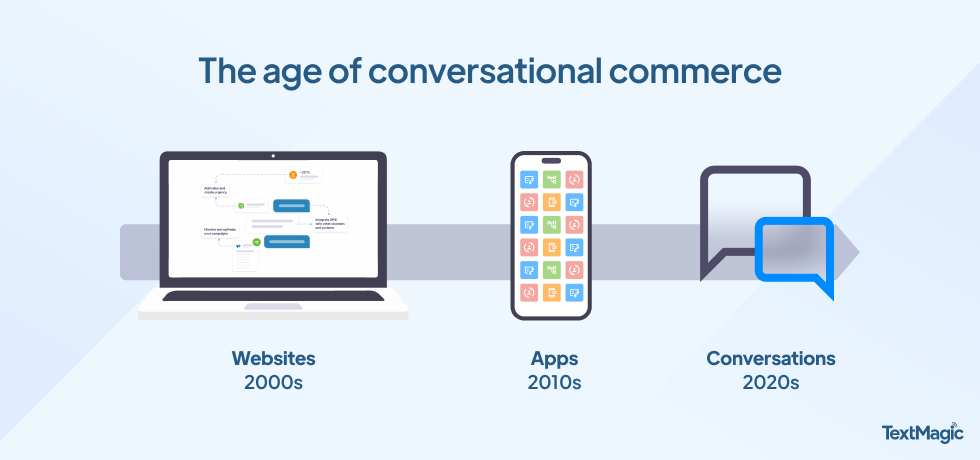
In 2021, the global conversational commerce market was valued at US$5,345.5 million. In 2023, it is projected to reach US$26,301.8 million, exhibiting a compound annual growth rate (CAGR) of 15.6% during the period from 2022 to 2032.
This exponential growth presents a tremendous opportunity for businesses to capitalize on this emerging trend and stay ahead of the competition.
By embracing conversational commerce, companies can foster meaningful and personalized interactions with their customers, leading to increased engagement, customer satisfaction, and, ultimately, revenue growth.
In this article, we will explore the definition and concept of conversational commerce, as well as delve into the importance and benefits of implementing it in business strategies.
What is conversational commerce?
Conversational commerce refers to the use of messaging platforms, chatbots, and other communication tools to facilitate real-time conversations between businesses and customers.
It leverages technologies like artificial intelligence (AI) and natural language processing (NLP) to create interactive and personalized experiences, simulating human-like conversations.
Benefits of engaging in conversational commerce
Here are some of the main benefits of conversational marketing:
- By integrating messaging platforms into their customer support and sales processes, businesses can offer real-time assistance, answer queries, and provide tailored recommendations, creating a more engaging and satisfying experience for customers.
- Conversational commerce also allows for targeted promotions and personalized offers, further boosting customer engagement and loyalty.
- Businesses can provide round-the-clock support and assistance. Automated chatbots can handle routine queries, provide product information, and process simple transactions even outside regular business hours.
- Conversational commerce reduces the need for manual, time-consuming interactions. Chatbots and automated messaging systems can handle a significant volume of customer inquiries simultaneously, freeing up human resources to focus on more complex tasks.

Where is marketing headed?
The Future of Marketing is Conversational, and the insights from the State of Conversational Commerce Report, affirm this notion. With 88% of consumers actively seeking text messaging conversations with brands, SMS has clearly emerged as a critical channel for businesses to engage and transact with their audience effectively.
According to the same report, a staggering 91% of consumers have either already opted into at least one brand’s SMS program or expressed their interest in doing so. This statistic clearly demonstrates the growing acceptance and demand for SMS as a preferred communication channel between consumers and brands.
The role of SMS in enabling conversational commerce
SMS plays a crucial role in enabling conversational commerce by providing a direct and instant communication channel between businesses and customers.
Texts help provide interactive and personalized experiences similar to face-to-face interactions. Through SMS, businesses can engage in two-way communication, responding to customer queries, providing support, and facilitating transactions.
Advantages of using SMS for customer engagement and transactions
- Text messages have a high open rate, with most recipients reading the messages within minutes. This ensures that your communication is promptly received and has a higher chance of being acted upon.
- Texts allow businesses to engage with customers instantly. This real-time communication fosters a sense of urgency and enables businesses to deliver timely information and offers.
- Texts can be personalized with customer information. By segmenting your audience and sending targeted messages, you can ensure that the content is relevant and resonates with recipients. Personalization enhances customer engagement and increases the likelihood of conversion.
- SMS marketing relies on customers opting in to receive messages, ensuring that you are reaching an audience interested in your products or services. Furthermore, SMS provides an easy opt-out mechanism, allowing customers to unsubscribe from receiving messages if they no longer wish to receive them. This ensures compliance with privacy regulations and respects customers’ preferences.
- SMS is a non-intrusive communication channel that fits seamlessly into customers’ daily routines. It does not require an internet connection or specific smartphone capabilities, making it accessible to a wide range of users.

How to implement conversational commerce via SMS marketing
According to a recent Attentive survey, 52% of respondents expressed their intention to boost their SMS marketing budget in 2023. On average, they plan to increase their investment by 14% year over year.
The same study showed that SMS has proven to be a highly effective channel for brands to retain and expand their customer base. Among the marketers surveyed, 53% consider SMS as one of their top three revenue-generating channels. Additionally, out of those respondents, 22% reported that over 20% of their total revenue is derived from their SMS marketing program.
Below are a few strategies that will help you implement conversational commerce through texts.
Build personalized and interactive SMS campaigns
- Divide your customer base into segments based on demographics, preferences, or purchase history. This allows you to tailor your SMS campaigns to specific groups and send more relevant messages.
- Incorporate interactive elements like clickable links or buttons within your SMS messages. For example, you can send a message with a link to a mobile-optimized landing page where customers can explore products or complete a purchase.
- Use customer data to personalize your SMS content. Include the recipient’s name, reference their past purchases or preferences, and provide personalized offers or recommendations.
Starbucks utilizes SMS marketing to engage customers with personalized offers, rewards, and promotions. For instance, Starbucks may send SMS messages addressing customers by their names and referencing their favorite drinks or past purchases.
They also provide personalized offers, such as discounts on specific menu items or bonus rewards for frequent visitors. By tailoring their SMS campaigns to individual customers, Starbucks creates a sense of exclusivity and makes customers feel valued.
By leveraging Textmagic’s features, businesses can implement personalized and interactive SMS campaigns similar to Starbucks, fostering customer engagement, loyalty, and ultimately driving sales.
Integrate chatbot technology for automated conversations
- Use chatbots to greet new subscribers, provide information about your products or services, and guide them through the onboarding process.
- Train your chatbot to handle frequently asked questions and provide instant support to customers. This can include information about shipping, returns, order status, or general inquiries.
- Implement a chatbot that analyzes customer preferences and purchase history to offer personalized product recommendations via SMS. Customers can engage with the chatbot by answering questions or providing feedback.

Strategies for effective customer engagement through SMS
- Send SMS messages at appropriate times and avoid excessive messaging. Respect local regulations and customer preferences regarding the frequency of communication.
- Keep SMS messages short, clear, and easy to understand. Use concise language and avoid jargon or complex terms.
- Include a clear call-to-action in your SMS messages, such as Reply YES to confirm or Click here to learn more. This encourages customer engagement and guides them towards the desired action.
Ensure privacy and security in conversational SMS interactions
- Ensure that you have obtained proper consent from customers before sending them SMS messages. Follow applicable data protection laws and regulations.
- Safeguard customer data collected during SMS interactions. Encrypt sensitive information and implement secure storage practices to protect customer privacy.
- Provide an easy opt-out mechanism for customers who no longer wish to receive SMS messages. Respect their preferences and promptly remove them from your SMS marketing list.
Conversational commerce SMS templates
Next, we will present you with 10 examples of conversational commerce via SMS marketing. Alongside each example, we provide ready-to-use templates that you can customize to fit your brand and engage your audience effectively.
1. Product recommendations/upselling
Hi [Customer Name], we thought you might be interested in our latest collection! Check out our website for trendy new arrivals. Happy shopping! [Company Name]
Hey [Customer Name], we have a special offer just for you! Upgrade to our premium plan and enjoy exclusive features. Visit our website or call us at [Phone Number] for more details. [Company Name]
Hi [Customer Name], based on your recent purchase, we think you’ll love our accessories line. Take a look at our website for stylish add-ons to complete your look. [Company Name]
2. Support chat
Hi [Customer Name], we’re here to help! Please provide a brief description of the issue you’re experiencing, and our support team will get back to you shortly. [Company Name]
Hey [First Name], we apologize for any inconvenience caused. Our team is currently addressing technical difficulties. We appreciate your patience and will resolve the issue as soon as possible. [Company Name]
Hi [First Name], thank you for reaching out to us. Our support hours are [Support Hours]. We’ll be with you shortly. In the meantime, you can check our FAQ page [Provide Link] for quick answers. [Company]
3. Feedback and surveys
Hi [First Name], we value your opinion! Please take a moment to provide feedback on your recent experience with us. Your input helps us improve our services. Thank you! [Company Name]
Hey [First Name], we’re conducting a quick survey to understand your satisfaction level. Please rate your experience on a scale of 1–10, with 10 being the highest. Your feedback is important to us. [Company Name]
Hi [First Name], thank you for choosing [Company Name]. We would appreciate it if you could take a minute to share your thoughts on how we can serve you better. Click the following link to start the survey: [Survey Link]. [Company Name]
4. Loyalty programs
Hi [First Name], as you are a valued customer, we’re excited to introduce our new loyalty program! Earn points with every purchase and enjoy exclusive rewards. Enroll now on our website or in-store. [Company Name]
Hey [First Name], we appreciate your loyalty! Get ready for exclusive perks and discounts as a member of our loyalty program. Keep an eye out for personalized offers coming your way. [Company Name]
Hi [First Name], we want to thank you for your continued support. As a token of our appreciation, we’re offering double points for all purchases this week. Start earning rewards today! [Company Name]
5. Data collection
Hi [First Name], we’re updating our customer records to serve you better. Can you please reply with your current email address? Thank you! [Company Name]
Hey [First Name], your opinion matters to us. Help us understand your preferences better by answering a few quick questions. Reply ‘Yes’ to participate. Thank you! [Company Name]
Hi [First Name], we’re conducting a brief survey to gather demographic information. Your responses will remain anonymous. Please take a moment to answer a few questions. Thank you! [Company Name]
6. Exclusive contests and giveaways
Hey [First Name]! We’re running an exclusive contest just for our valued customers. Reply with the keyword ‘ENTER’ for a chance to win [Prize]. Hurry, the contest ends in [X] days! Good luck!
Hi there, It’s [Company Name]. Ready for some excitement? We’re giving away [Prize] to one lucky winner. To participate, simply reply with ‘WIN’ and stay tuned for the big announcement. Don’t miss out!
Hello [First Name]! As a token of appreciation, we’re hosting a special giveaway. Text ‘LUCKY’ to [Phone Number] for a chance to win [Prize]. Winners will be announced next week. Share the excitement!
7. Abandoned cart recovery
Hi [First Name]! We noticed you left something amazing in your cart. Don’t miss out! Complete your purchase now and enjoy [Discount/Free Shipping]. Click [Link] to return to your cart. Limited time offer!
Hey there! We saved your items, but they won’t stay in your cart forever. Get back to your shopping and enjoy [Discount] on your order. Click [Link] to reclaim your cart. Happy shopping!
Oops! Looks like you forgot something awesome in your cart. Complete your purchase now and get [Discount/Free Gift]. Just click [Link] to return to your cart. We’re here to help if you have any questions!
8. Flash sales and limited-time offers
Attention, [First Name]! Today only, enjoy an exclusive flash sale. Get [Discount]% off on all products. Use code [Promo Code] at checkout. Start shopping now: [Link]. Hurry, the clock is ticking!
Breaking news! We’re having a lightning-fast sale for our VIP customers. For the next [X] hours, enjoy [Discount]% off storewide. Don’t miss this chance to grab your favorites. Shop now: [Link].
Hello, [First Name]! We’re thrilled to offer you a limited-time deal. Enjoy [Discount]% off our bestselling items for the next [X] days. Click [Link] to explore the selection. Act fast, stock is flying!
9. Exclusive content or sneak peeks
Hey [First Name], Exciting news! You’re part of our exclusive insiders’ club. Get ready for a sneak peek of our upcoming collection before anyone else. Click [Link] to be the first to see it!
Hello there! As you are a valued customer, we have a surprise for you. Enjoy early access to our exclusive content. Check out our blog for insider tips, industry trends, and exciting announcements. Happy exploring!
Hi [First Name], We thought you’d love a glimpse behind the scenes. We’ve got exclusive content just for you, including interviews with our designers and a sneak peek into our creative process. Stay tuned!
10. Customer onboarding and education
Welcome aboard, [First Name]! We’re thrilled to have you as a new customer. Stay tuned for helpful tips, product tutorials, and special offers delivered straight to your inbox. Get ready to explore and enjoy!
Hey [First Name], Thanks for choosing us! Let’s kick off your journey with us. Watch this short video to learn how to make the most of our products/services. Any questions? Just reply, and we’ll assist you.
Hello [First Name]! We believe in making your experience seamless. To get started, visit our website for a step-by-step guide to set up your account. Need assistance? Text us, and our team will gladly help you out!
Wrapping up
While SMS marketing is a valuable promotional tool, you will need to ensure that your campaigns provide value to customers. Offer exclusive content, sneak peeks, and educational resources to enhance their experience and build loyalty.
By creating personalized and interactive SMS campaigns, integrating chatbot technology, and employing effective customer engagement strategies, businesses can leverage the benefits of conversational commerce via SMS.
Related articles
Quick guide on how to maintain your smartphone
In a world where digitalization meets technology, sm...
Scam text message examples and how to protect yourself from SMS phishing
Text message scams, also known as SMS scams or text ...
What is SMS OTP (One-Time Passcode) verification?
As more and more businesses nowadays increasingly mo...
Drive sales and provide support on every channel with Textmagic Chat
Ever wished a customer support agent would reply fas...
Mastering customer feedback: Top 20+ tools to explore in 2025
Listening to the customer has evolved into the corne...




